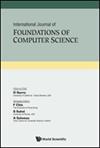Language Classes of Extended Distributed Reaction Systems
IF 0.6
4区 计算机科学
Q4 COMPUTER SCIENCE, THEORY & METHODS
International Journal of Foundations of Computer Science
Pub Date : 2023-07-04
DOI:10.1142/s0129054123460024
引用次数: 0
Abstract
Reaction systems are well-known formal models of interactions between biochemical reactions. A reaction system is a finite set of triples (reactants, inhibitors, products) that represent chemical reactions, where the reactants, the inhibitors, and the products are objects corresponding to the chemicals. The reactions may facilitate or inhibit each other. A distributed reaction system consists of a finite set of reaction systems that interact with their environment (function in a given context). The environment is a finite set of reactants provided by a context automaton. In the preceding paper, we studied distributed reaction systems where in each step, the context automaton provided a separate set of reactants to the component reaction systems. We assigned languages to these distributed reaction systems and provided representations of some well-known language classes by these constructs. In this paper, the context is provided for the whole distributed reaction system and the component reaction systems distribute the context among each other in different ways (the same context is valid for each component, or the context is split among the components). As in the preceding paper, we assign languages to these new types of distributed reaction systems and provide representations of well-known language classes (the class of right-linear simple matrix languages, the recursively enumerable language class).扩展分布式反应系统的语言类
反应系统是众所周知的生物化学反应之间相互作用的形式模型。反应系统是一组有限的三元组(反应物、抑制剂、产物),代表化学反应,其中反应物、抑制物和产物是与化学物质相对应的物体。这些反应可以相互促进或抑制。分布式反应系统由一组有限的反应系统组成,这些反应系统与其环境相互作用(在给定的上下文中起作用)。环境是由上下文自动机提供的有限组反应物。在前一篇论文中,我们研究了分布式反应系统,其中在每一步中,上下文自动机都向组分反应系统提供一组单独的反应物。我们将语言分配给这些分布式反应系统,并通过这些构造提供了一些众所周知的语言类的表示。在本文中,为整个分布式反应系统提供上下文,并且组件反应系统以不同的方式在彼此之间分配上下文(相同的上下文对每个组件有效,或者上下文在组件之间拆分)。正如在前一篇论文中一样,我们将语言分配给这些新类型的分布式反应系统,并提供已知语言类(右线性简单矩阵语言类,递归可枚举语言类)的表示。
本文章由计算机程序翻译,如有差异,请以英文原文为准。
求助全文
约1分钟内获得全文
求助全文
来源期刊

International Journal of Foundations of Computer Science
工程技术-计算机:理论方法
CiteScore
1.60
自引率
12.50%
发文量
63
审稿时长
3 months
期刊介绍:
The International Journal of Foundations of Computer Science is a bimonthly journal that publishes articles which contribute new theoretical results in all areas of the foundations of computer science. The theoretical and mathematical aspects covered include:
- Algebraic theory of computing and formal systems
- Algorithm and system implementation issues
- Approximation, probabilistic, and randomized algorithms
- Automata and formal languages
- Automated deduction
- Combinatorics and graph theory
- Complexity theory
- Computational biology and bioinformatics
- Cryptography
- Database theory
- Data structures
- Design and analysis of algorithms
- DNA computing
- Foundations of computer security
- Foundations of high-performance computing
 求助内容:
求助内容: 应助结果提醒方式:
应助结果提醒方式:


